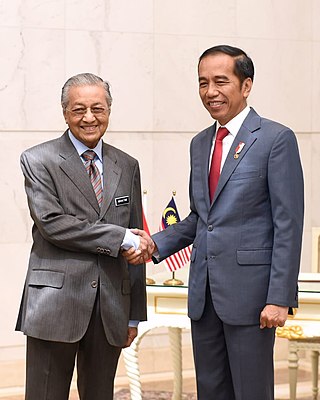
Since independence, Indonesian foreign relations have adhered to a "free and active" foreign policy, seeking to play a role in regional affairs commensurate with its size and location but avoiding involvement in conflicts among major powers. During the presidency of Sukarno, Indonesia's foreign relations were marked by engagement with other newly independent nations in Asia and Africa, as exemplified by the Bandung Conference, the subsequent foundation of the Non-Aligned Movement and a confrontational attitude towards Western powers, justified by a belief in the CONEFO and opposition to what Sukarno termed as NEKOLIM.

Indonesia–Russia relations are the bilateral relations between Indonesia and Russia. Indonesia and the Soviet Union established diplomatic relations in 1950. Russia has an embassy in Jakarta, and Indonesia has an embassy in Moscow along with a consulate general in Saint Petersburg. Both countries are members of the APEC and G-20.

Hungary–Indonesia relations refer to bilateral relations between Hungary and Indonesia. The two countries established diplomatic relations in 1955. A Hungarian embassy was opened in Jakarta in 1957. In line to Hungarian "Eastern Opening" policy, and due to Indonesian political weight and market potentials, Hungary considered Indonesia as one of the most influential states in the ASEAN. While Indonesia sees Hungary as a potential market and a strategic entrance to penetrate the markets of Central Europe and Eastern Europe. Hungary has an embassy in Jakarta and honorary consuls in Bandung and Denpasar, while Indonesia has an embassy in Budapest.

Indonesia and Ukraine established diplomatic relations in 1992. Indonesia has an embassy in Kyiv that also accredited for Georgia and Armenia, while Ukraine has an embassy in Jakarta. Both nations has agreed to expand cooperations in heavy industries, military, space technology and exploration, tourism, sports, economy and trade sectors, as well as cooperations within international organizations.
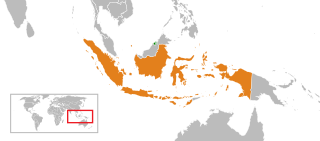
Brunei Darussalam and Indonesia established diplomatic relations in 1984. Since then, both country enjoys warm and friendly relations. Brunei has an embassy in Jakarta, while Indonesia has an embassy in Bandar Seri Begawan. Indonesia and Brunei don't share direct land borders. Since diplomatic relations were established back in 1984, Overall relations between the two countries were progressing well and that both sides continued to enjoy strong ties in a wide spectrum of co-operations; including trade and investment, tourism, agriculture, marine and fisheries, health, defence, transnational crimes, education, youth, culture and people-to-people contacts.

Bangladesh and Indonesia established diplomatic relations in 1971. Indonesia is the world's largest Muslim country, whereas Bangladesh is the world's fourth largest Muslim country. They are partners in the United Nations and various multilateral organisations, particularly in international peacekeeping, the Developing 8 Countries, the Non-Aligned Movement, the World Trade Organization and the Organisation of Islamic Cooperation. Bangladesh has an embassy in Jakarta, whereas Indonesia has an embassy in Dhaka. Official diplomatic relations were established in 1972 after Indonesia became one of the first Muslim countries to recognise independent Bangladesh.

Indonesia and the United Arab Emirates (UAE) established diplomatic relations in 1976. The diplomatic relations are important because both share the solidarity as Muslim majority countries. Indonesia has an embassy in Abu Dhabi, while the United Arab Emirates has an embassy in Jakarta. Both countries are members of the World Trade Organization (WTO), The Non-Aligned Movement and Organisation of Islamic Cooperation (OIC).
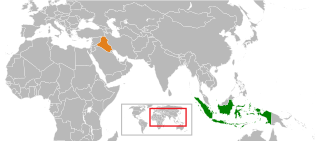
Indonesia and Iraq established diplomatic relations in 1950. Diplomatic relations are important since they share similarity as Muslim majority countries. Indonesia is the most populous Muslim country in the world, while Iraq also a Muslim majority nation. Diplomatic relations were established in 1950. Indonesia has an embassy in Baghdad, while Iraq has an embassy in Jakarta. Both nations are members of the Non-Aligned Movement and Organisation of Islamic Cooperation (OIC).

Indonesia–North Korea relations refers to bilateral relations between Indonesia and North Korea. The two countries established diplomatic relations in 1961. Indonesia is one of the very few countries that still tries to maintain cordial relations with North Korea, despite the widespread international sanctions and resulting isolation imposed on North Korea, compounded with the negative reputation of its human rights, nuclear weapons and ballistic missile programs and Indonesia's publicly more robust engagement and partnership with South Korea.
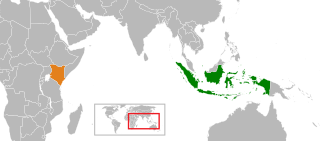
Indonesia and Kenya established diplomatic relations in July 1979. Indonesia has an embassy in Nairobi, also accredited to Mauritius, Seychelles, and Uganda, and in 2022 Kenya established its embassy in Jakarta. Both nations are partners in multilateral organizations, such as the World Trade Organization (WTO) and Non-Aligned Movement.

Indonesia and Morocco established diplomatic relations in 1960. Both are the Muslim-majority countries; Indonesia is the most populous Muslim country in the world, while Morocco is also a Muslim majority nation. Morocco praised Indonesia as a strong democratic nation, and pointed out that both nations face the same challenges of separatism and terrorism. Diplomatic relations were established in 1960. Indonesia has an embassy in Rabat and a consulate in Casablanca, while Morocco has an embassy in Jakarta. Both nations are members of the World Trade Organization (WTO), Group of 77, Non-Aligned Movement and Organisation of Islamic Cooperation (OIC).

Algeria and Indonesia established diplomatic relations in 1963. The relationship is mostly founded on common religious and anti-colonialism solidarity, as Indonesia and Algeria are Muslim-majority countries that also once fell under colonialism. Algeria recognized Indonesia's role on supporting their country on gaining independence in 1962. Both countries agreed on expanding cooperations and strengthening relations. Algeria has an embassy in Jakarta that also accredited to Singapore and Brunei, while Indonesia has an embassy in Algiers. Both nations are members of the Non-Aligned Movement, Group of 77 and Organisation of Islamic Cooperation (OIC).
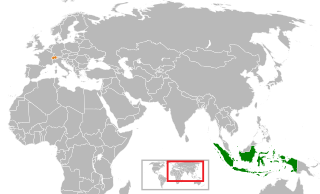
Indonesia and Switzerland established diplomatic relations in 1952. In 2010, the heads of state of the two countries agreed to launch negotiations on a Comprehensive Economic Partnership Agreement (CEPA). Switzerland has named Indonesia as one of seven priority countries for economic development cooperation. Indonesia has an embassy in Bern, while Switzerland has an embassy in Jakarta, also accredited for East Timor and ASEAN.

Indonesia and Saudi Arabia established diplomatic relations in 1950. Relations are particularly important because Saudi Arabia is the birthplace of Islam, and Indonesia is home to the world's largest Muslim population; both are Muslim majority countries. Economy and trade relations are also particularly important, especially on oil (energy) and human resources sectors. Saudi Arabia has an embassy in Jakarta, while Indonesia has an embassy in Riyadh and a consulate in Jeddah. Both countries are members of the Organisation of Islamic Cooperation and G-20 major economies.

Indonesia and Tunisia established diplomatic relations in 1960. In early 2010s, relations are particularly important following the Arab Spring, as Tunisia seeks Indonesia as an example of democracy in a Muslim-majority country, while Indonesia has expressed its willingness to support the democratic transition in Tunisia through a capacity for building and a partnership in democracy. Indonesia has described Tunisia as a shining example of a democratic transition in the Arab World. The diplomatic relations dated back to the 1950s when Indonesia supports Tunisian independence from France. Indonesia has an embassy in Tunis, while Tunisia has an embassy in Jakarta. Both countries are members of the Organisation of Islamic Cooperation and the Non-Aligned Movement.

Indonesia–Kuwait relations was officially established on February 28, 1968. The relations focused on economy and trade sectors, especially on energy (oil) and human resources. Kuwait have an embassy in Jakarta, while Indonesia have an embassy in Kuwait City. Both countries are the member of Organisation of Islamic Cooperation and Non-Aligned Movement.

Indonesia–Sudan relations was officially established in 1960. In February 2012, during a visit of Sudanese Foreign Minister Ali Karti to Jakarta, Indonesia and Sudan has agreed to foster bilateral relations in politics, science, education and economic sectors. Indonesia has an embassy in Khartoum, while Sudan has an embassy in Jakarta. Both countries have Muslim-majority population and both are members of Organisation of Islamic Cooperation.

Foreign relations were officially established in 1992. Azerbaijan appreciates Indonesia's support in international forums on Azerbaijan position regarding the Nagorno-Karabakh conflict. Azerbaijan has an embassy in Jakarta while Indonesia has an embassy in Baku. Both nations are the member of Organization of Islamic Cooperation and Non Aligned Movement.

Indonesia and Serbia established diplomatic relations in 1954, with the legal frameworks was inherited from the Yugoslavian era. Indonesia has an embassy in Belgrade and Serbia has an embassy in Jakarta. Both nations are the founders of Non Aligned Movement.

Indonesia–Oman relations was officially established in 1978. Indonesia and Oman are Muslim majority countries and shares same commitment in pursuing global peace and prosperity. Indonesia has an embassy in Muscat, while Oman has an embassy in Jakarta. Both countries are the member of Organization of Islamic Cooperation and also Non Aligned Movement.






















